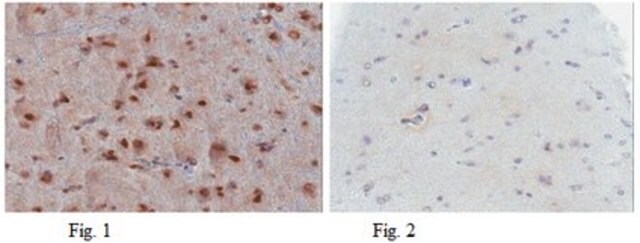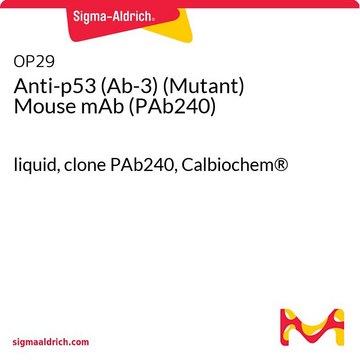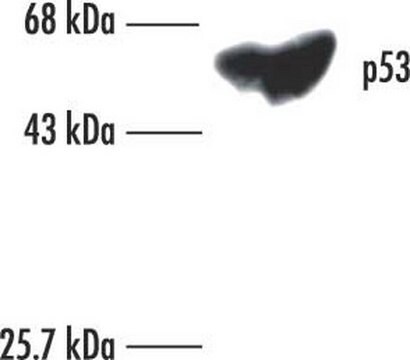OP29L
Anti-p53 (Ab-3) (Mutant) Mouse mAb (PAb240)
lyophilized, clone PAb240, Calbiochem®
Sinônimo(s):
Anti-p53 antibody
About This Item
Produtos recomendados
fonte biológica
mouse
Nível de qualidade
forma do anticorpo
purified antibody
tipo de produto de anticorpo
primary antibodies
clone
PAb240, monoclonal
Formulário
lyophilized
não contém
preservative
reatividade de espécies
hamster, rat, mouse, bovine, chicken, human
não deve reagir com
Xenopus
fabricante/nome comercial
Calbiochem®
condição de armazenamento
OK to freeze
Isotipo
IgG1
Condições de expedição
ambient
temperatura de armazenamento
2-8°C
modificação pós-traducional do alvo
unmodified
Informações sobre genes
human ... TP53(7157)
Descrição geral
Imunogênio
Aplicação
Frozen Sections (10 µg/ml)
Gel Shift (see comments)
Immunoblotting (5 µg/ml)
Immunofluorescence (1-20 µg/ml)
Immunoprecipitation (1 µg per sample)
Paraffin Sections (see application references)
Advertência
forma física
Reconstituição
Nota de análise
SK-OV-3 cells
A431, Hs27 (wild-type p53), or SK-BR-3 cells or breast carcinoma
Outras notas
Greenblatt, M.S., et al. 1994. Cancer Res.54, 4855.
Barak, Y., et al. 1993. EMBO J.12, 461.
Kastan, M.B., et al. 1992. Cell71, 587.
Kuerbitz, S.J. 1992. Proc. Natl. Acad. Sci. USA89, 7491.
Lane, D.P. 1992. Nature358, 15.
Kastan, M.B., et al. 1991. Cancer Res.51, 6304.
Informações legais
Não está encontrando o produto certo?
Experimente o nosso Ferramenta de seleção de produtos.
Código de classe de armazenamento
11 - Combustible Solids
Classe de risco de água (WGK)
WGK 1
Certificados de análise (COA)
Busque Certificados de análise (COA) digitando o Número do Lote do produto. Os números de lote e remessa podem ser encontrados no rótulo de um produto após a palavra “Lot” ou “Batch”.
Já possui este produto?
Encontre a documentação dos produtos que você adquiriu recentemente na biblioteca de documentos.
Nossa equipe de cientistas tem experiência em todas as áreas de pesquisa, incluindo Life Sciences, ciência de materiais, síntese química, cromatografia, química analítica e muitas outras.
Entre em contato com a assistência técnica








